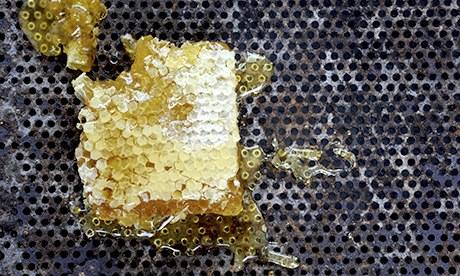
Sticky, fragrant honey is nature's most interesting sweetener and alwaysastonishing in the way its scent, taste and colour reflects the flora from which the bees collect their nectar. Honey from pine forests and heather moors tends to be more amber in colour, with a stronger, resinous flavour. Honey from orange blossom or acacia is lighter in taste and hue. Lavender honey captures that plant's distinctive herbaceous perfume, and manuka has a toffee-like quality.
Bees like buzzing around cities, too. In Liverpool, you can buy fantastic Postcode Honey that varies with hive location (L8 for Toxteth, for instance):, and see how the flavour and colour change almost from street to street.
Why is honey good for me?
Raw, cold extracted honey hasn't been heat-treated and "purified", so still contains its full complement of enzymes and antioxidants, and has antibacterial properties. Manuka honey is most effective in killing antibiotic-resistant infections, such as MRSA.
Manuka is the only honey so far that is widely acknowledged to have proven medicinal effects, but earlier this year a study at the University of Glasgow's School of Veterinary Medicine found that heather honey also killed MRSA microbes and three other strains of pathogenic bacteria.
Raw honey is increasingly used to treat hard-to-heal wounds. Several studies support the traditional use of honey as a cough soother. But like all sugars, honey should only be eaten in small amounts, which isn't that hard, because its natural intensity makes it tough to overdo anyway.
Where to buy and what to pay
Wholefood shops have the range of raw honeys, but also checkout local honeys at farmers' markets. If you are looking for a raw honey with activity strong enough to be therapeutic, go for one labeled 10+. Guide price: £5-£10 per 340g pot of raw honey, more for manuka.
• Joanna Blythman is the author of What To Eat (Fourth Estate, £9.99). To order a copy for £7.99 with free UK p&p, go to theguardian.com/bookshop
Grilled honeyed chicken skewers
These make a tasty little party snack; but, if you don't have time to make skewers, grill the thighs whole and finish in the oven for a delicious supper with salad and rice.
Serves 4
½ tsp coriander seeds
½ tsp fennel seeds
5 tbsp flavoursome honey
Juice and zest of 1 lemon, 1 extra to serve
Juice and zest of 1 orange
4 spring onions, finely chopped
4 sprigs of thyme, leaves stripped from stalks and chopped
2 sprigs rosemary, leaves stripped from stalks and chopped
1 sprig sage, leaves stripped from stalks and chopped
8 boneless chicken thighs, skinned and cut into 4cm squares
Salt and pepper
1 Soak some wooden skewers in water. Toast the coriander and fennel seeds in a small pan until golden and then grind them in a pestle and mortar or grinder.
2 Warm the honey a little and measure it out with a hot spoon into a bowl, along with the orange and lemon juices and zest, spring onions and herbs and finally the ground spices.
3 Season the chicken pieces with salt and pepper. Toss in the marinade and leave for as long as you can, but for at least a couple of hours.
4 When you are ready to cook the chicken, heat the grill or a ridged grill pan, lift the meat out of the marinade and set in a sieve or colander while you thread on to skewers. Grill the skewers until golden brown on each side until cooked through.
5 Transfer to a warm serving plate and serve with some wedges of lemon to squeeze on top.
Rosie Sykes is head chef of Fitzbillies (fitzbillies.com) and co-author of The Kitchen Revolution (Ebury Press, £25). To order a copy for £19.99 with free UK p&p, go to theguardian.com/bookshop

